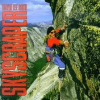It had been four years since Dave Lee Roth and Van Halen had released the iconic rock album 1984 and whilst the three remaining members were on a creative and production high with their first U.S.A. Number 1, 5150 and were on the verge of securing the second of 4 top spots on the bounce, ‘Diamond Dave’ was also enjoying his new found status as a solo star. There are very few people that really deserve the moniker before their name, especially when they have been so entwined with a band that had hit such incredible highs but in Dave Lee Roth, the moniker not only fits, it simply oozes polish and craves the title.
Skyscraper was Dave Lee Roth’s second album after his 1986 solo debut Eat ‘Em and Smile and whilst the debut may have garnered a higher position in the charts and critical success upon release but Skyscraper certainly is an album that exudes sparkling personality and cracking tracks. In part this can be seen as testament to the personal that Dave Lee Roth surrounded himself with to make the album. By sticking with the same musicians that had made the debut a glittering achievement, Dave Lee Roth was onto a real winning formula.
Alongside the man whose vocals had an element of the rock excess and personal moments of show business made him such an iconic vision to watch, there was also the incredible talent of Steve Vai, at one point the guitarist’s guitar player and whose pedigree needed reams of A4 paper just to do him credit, the likeable Billy Sheehan on bass who also would go on to bigger and much brighter things eventually and Gregg Bissonette on drums., who like Steve Vai, can be seen as one of the hardest working musicians on the American Rock circuit.
Skyscraper is a superb album in the pantheon of work that involves Dave Lee Roth but it also relies on those around him, not just the three other main contributors but the guest musicians who also add greatly to the overall sound and production.
The album starts strongly with the track Knucklebones, a neat song that shows that the work on Eat ‘Em and Smile was not wasted. However the album really kicks off when it reaches the second track, the outstanding Just Like Paradise. If Jump was Van Halen’s moment to shine during Dave Lee Roth’s first occasion as the lead vocalist before rejoining for the 2012 album A Different Kind of Truth, then by a country mile Just Like Paradise was his own piece of musical immortality. It has all the attributes of an American 80s classic, beefed up by the thought of bars, clubs and venues from New York to Los Angeles singing along to the highly infectious chorus.
The lyrics may well have the label of standard and formulaic shoved directly into the rock flag bearing American way but the chorus stands out with its short burst of anthem that gives the people listening to the song something tangible to grab onto. It certainly may be a staple of the genre but it works and gives a hook for the fan to whistle and sing along too thereby making it their own. The opening line “Some folks say ‘easy come is easy go (And some folks say)” gives it that mass appeal, by placing the use of the homely word folks, it gives the listener a thought of their own folks and family back home, something that in times of mass movement across the wide expanse that is the United States of America, gives the young generation who grew up listening to the Van Halen’s early albums something tangible to hold onto. It also has the double edged sword which is clever in terms of music writing that folks can be seen as derogatory, as though it is a phrase from someone that can be easily dismissed and disregarded. This secondary notion is further enhanced when the boy in the song shows his true feelings to the girl and tells her ‘I don’t want to go home.’
If the listener tries comparing David Lee Roth’s last album with Van Halen before they split, the incredible 1984, to Skyscraper, Eat ‘Em and Smile or any of the solo albums that the vocalist made away from the confines and secure shell of one of America’s premier rock bands they would be disappointed in their comparisons. It is near impossible to put any of Dave Lee Roth’s solo albums into the vein that 1984 provided. However take 1984 out of the equation and songs such as the title track written by both Steve Vai and Dave Lee Roth, the brilliant Stand Up, the rocking The Bottom Line and Two Fools a Minute could easily stand side by side the tracks in the band’s first five studio albums.
The critics may argue but Skyscraper stands out as the defining solo moment of Dave Lee Roth’s recording career, big, brash, and unapologetic whilst at all times being marvelously performed. A real exercise in American rock culture and unremitting in its duty to entertain.
Ian D. Hall
